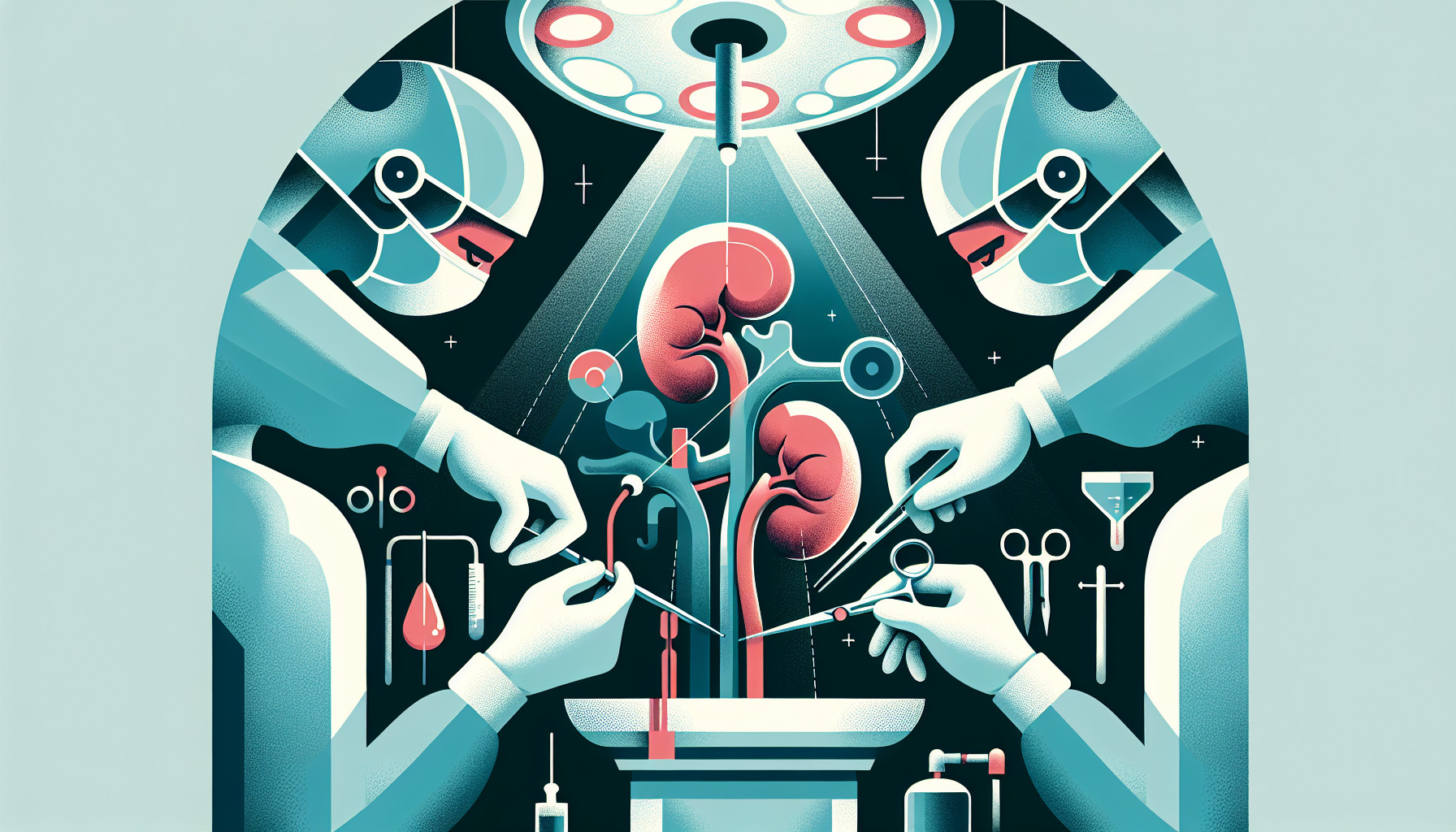Our Summary
This research was conducted to determine if a type of kidney removal surgery (laparoscopic donor nephrectomy) can be safely and effectively done by a single surgeon using a camera holder, with only a nurse to assist. The study was carried out in Seoul, South Korea and was approved by the relevant authorities.
Of the 47 people who were considered for the study, 40 agreed to participate. The results showed that all surgeries could be performed by a solo surgeon without any issues that required another human to step in and assist.
However, there were some complications during the surgeries, including spleen injuries and issues with the stapling device used in the procedure. After the surgeries, most patients experienced some side effects, including nausea, vomiting, and elevated liver enzymes, but these were generally not related to the fact that the surgery was performed solo.
In conclusion, the study found that this type of kidney removal surgery can be done by a single surgeon using a camera holder. However, the researchers suggest that some adjustments may need to be made to ensure the procedure is as safe as possible when performed solo.
FAQs
- Can a laparoscopic donor nephrectomy be performed by a single surgeon using a camera holder?
- What type of complications were encountered during the surgeries performed by a single surgeon?
- What side effects did patients experience after the surgery, and were they related to the surgery being performed by a single surgeon?
Doctor’s Tip
A helpful tip a doctor might tell a patient about laparoscopic nephrectomy is to follow all pre-operative instructions provided by the surgeon, including fasting before the surgery and stopping certain medications as directed. It is also important to discuss any concerns or questions with the surgeon before the procedure to ensure the best possible outcome. Additionally, following post-operative care instructions, such as proper wound care and medication management, is crucial for a successful recovery.
Suitable For
Patients who are typically recommended for laparoscopic nephrectomy include those with kidney cancer, a non-functioning or diseased kidney, kidney stones, or other kidney-related conditions that require surgical removal of the kidney. Additionally, patients who are in good overall health and are deemed suitable candidates for surgery may also be recommended for laparoscopic nephrectomy. It is important for patients to discuss their individual medical history and condition with their healthcare provider to determine if laparoscopic nephrectomy is the best treatment option for them.
Timeline
Timeline:
- Before the surgery:
- Patient meets with the surgeon to discuss the procedure and any potential risks or complications.
- Patient undergoes pre-operative testing and preparation.
- Patient is informed about the surgery and what to expect during the recovery process.
- During the surgery:
- Surgeon performs the laparoscopic nephrectomy using a camera holder and a nurse as the only assistant.
- Surgery may encounter complications such as spleen injuries or issues with the stapling device.
- After the surgery:
- Most patients experience side effects such as nausea, vomiting, and elevated liver enzymes.
- Patients are monitored for any post-operative complications and are given instructions for their recovery at home.
- Follow-up appointments are scheduled to check on the patient’s progress and ensure proper healing.
What to Ask Your Doctor
Some questions a patient should ask their doctor about laparoscopic nephrectomy include:
- What are the potential risks and complications associated with laparoscopic nephrectomy?
- How experienced are you in performing laparoscopic nephrectomy surgeries?
- Will I need any additional tests or evaluations before undergoing the surgery?
- What is the expected recovery time and what can I expect in terms of post-operative pain and discomfort?
- Will I need any follow-up appointments or ongoing care after the surgery?
- Are there any specific guidelines or precautions I should follow before and after the surgery?
- What are the success rates of laparoscopic nephrectomy in terms of removing the kidney and achieving the desired outcome?
- How will the surgery affect my overall kidney function and long-term health?
- Are there any alternative treatment options to consider before proceeding with laparoscopic nephrectomy?
- Are there any specific lifestyle changes or modifications I should make to support a successful recovery after the surgery?
Reference
Authors: An DH, Han JH, Jang MJ, Aum J, Kim YS, Jeong IG, Hong B, You D. Journal: BMC Urol. 2022 Mar 25;22(1):44. doi: 10.1186/s12894-022-00996-8. PMID: 35337318
